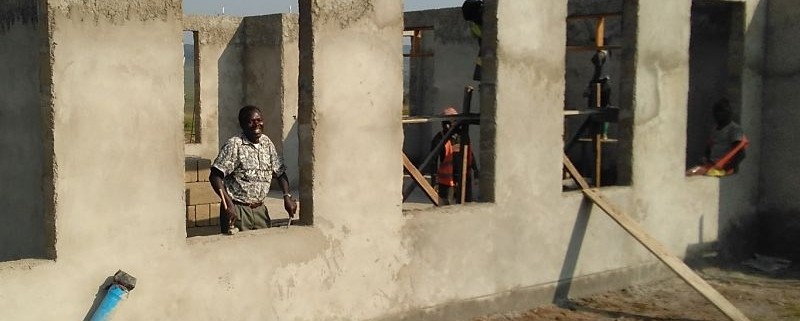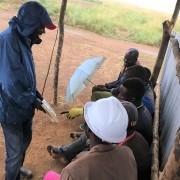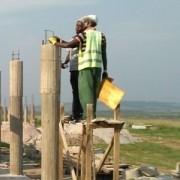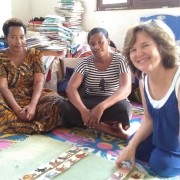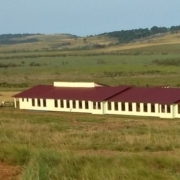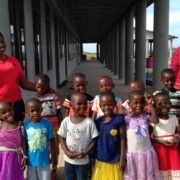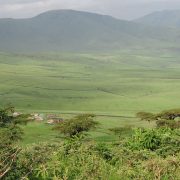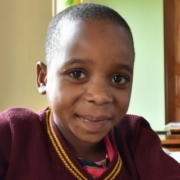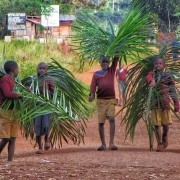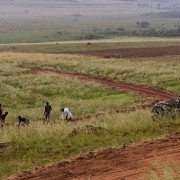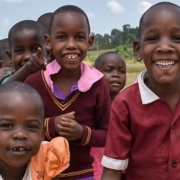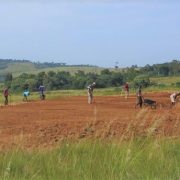The Fruit is Almost Ripe
Soon after Michael arrived in Tanzania last May to prepare for the construction of Twegashe School, he had a conversation with the former headmaster of the existing school in Bushasha, who shared some very valuable advice. Michael had described the project we were embarking on, and the headmaster, knowing that we would face many challenges, reminded him that, as the Swahili proverb says,”Mvumulivu hula mbivu,”—The one who is patient eats ripe fruit!
We’ve learned in the intervening months that the headmaster was definitely right about challenges and the need for patience. In fact, at the time Michael met him he was at the bank, trying to open a bank account for the NGO that we have formed in Tanzania. That process, which we thought would take two or three days, ended up taking almost five weeks! But we did finally get the account, and are now able to carry out the business of paying laborers and purchasing supplies to build Twegashe School.
Dealing with the weather has also been an exercise in patience. The past year has been, by all villager accounts, an especially rainy year. In late May there were very heavy rains that flooded our soccer field and left pools of standing water on the construction site. Although these rains delayed the start of construction, they were probably a blessing in disguise since we discovered the need for drainage work that might otherwise not have been revealed until after construction, when it would have been much harder to remediate. The very heavy rains did eventually stop, but the “long” dry season from June to October was not as long or as dry as usual. And the rains here are generally too heavy to work through. As a result, the crew had to spend at least two hours almost every day waiting out the rain. But they made the best of it, using the time for tasks like hand-twisting wire rebar ties, or being entertained by Michael as in the accompanying photo.
Opaque government processes have been another challenge. Our volunteer construction supervisor, Bill Suhr, came to Bushasha last June with the intention of staying until the end of December. Before Bill came we had begun the process of applying for a work permit which would allow him to be in the country for up to two years at a time. However, his application had not yet been reviewed by the time he was ready to come, so he entered Tanzania with a short-term business visa. When the Ministry of Labor finally got around to reviewing his application, they decided he needed some additional documentation. We provided that documentation after considerable scurrying around, since the documents they needed were from the US while Bill was already in Tanzania. But to no avail–our request for the permit was denied. The Tanzanian government was not convinced that the work Bill was doing could not be done by a Tanzanian. We filed an appeal and are stil waiting for the response, but in the meantime Bill was told that he had to leave since his business visa was no longer valid. So at the end of November Bill left, with the one consolation that he would be home in time to celebrate Thanksgiving with his family.
By good fortune, about a month before Bill left, we had found a Tanzanian builder, David Suddy, who is able to understand the architectural drawings and the type of earthquake resistant construction we are using well enough to allow him to fill Bill’s role. David is based in Arusha–contrary to the contention of the Ministry of Labor, there is no-one based in Bukoba with the kind of skill we need. He works for another charitable organization on a contract basis, but we were able to recruit him to work on our project when he is available. David spent some time here in November working with and learning from Bill, but then had to return to his work in Arusha. He was scheduled to be back in Bushasha in mid-December, but a mishap prevented him from coming at that time. He did finally arrive but he’ll have to leave again in three weeks. He is confident that in that time he will be able to put things on track to having at least one classroom available for use by mid-February. For that to happen, the roofers (who have also been delayed by unforeseen circumstances) will have to arrive here by the end of this month as they have promised they will. We were recently sharing with folks here the American expression “fingers crossed”–It’s an expression we use frequently right now!
Our search for two kindergarten teachers was one part of this whole process that was actually easier than we had expected, and the search has already yielded very fine fruit. The teachers we have hired, Editha Rutagwelera and Joanita Katabazi, have years of experience teaching kindergarten at English-medium schools in Tanzania. In addition to this experience, they are both clearly very fond of children and excited to be part of creating a program for a new school. In fact, they have already, on their own initiative, composed a draft of a Twegashe School song and school motto! As we wait for school construction to be completed, Editha and Joanita are meeting daily with volunteer Keela Williams for training on the Montessori method of teaching. Keela used to own and operate a Montessori school in Seattle, and she has donated her entire set of materials to Twegashe School. On top of that, she volunteered to spend a month and a half in Bushasha training our teachers. It is a delight to have her here, and very fun to see our teachers so excited about the things she is teaching them. In the course of their previous education they have been exposed to the Montessori method, but not in nearly this much detail or with such a wealth of beautiful materials.
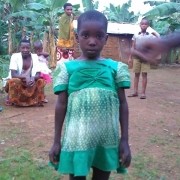
Agnes and her mother, who was initially afraid to sign up because she was thought she wouldn’t be able to pay
The classroom building is well underway, just waiting for a roof, and the teachers are hired and have begun training–all in preparation for the most important component of Twegashe School, the students. We faced an unexpected challenge in convincing some parents that having their child attend would not cost them more than they can afford. We are giving families the opportunity make a voluntary contribution to help defray the cost of running the school and also to give families some “skin in the game”. We have asked that they give only according to what they can afford. But since all other English-medium schools in this part of the country are for-profit private schools, this concept was difficult for some villagers to comprehend. The idea that donors in the US, out of the goodness of their hearts, want to help their children get a good education is so far from their every day experience that they have trouble believing it can be true. Michael has had to visit some families individually and explain this all to them personally in order to remove their doubts. It’s a lot of extra effort but the conversations are fruitful: We get better insight into the hardships these families face, and the message that an education for their child at Twegashe School is a gift, not a purchase that will strain their finances, is eventually getting through.
Through all the ups and downs we try to keep in mind the proverb shared by the headmaster. Having grown up in Tanzania has helped Michael to remain patient, and that patience has paid off. We will all soon enjoy the ripe fruit of seeing the first class of kindergartners laughing and learning at Twegashe School!

